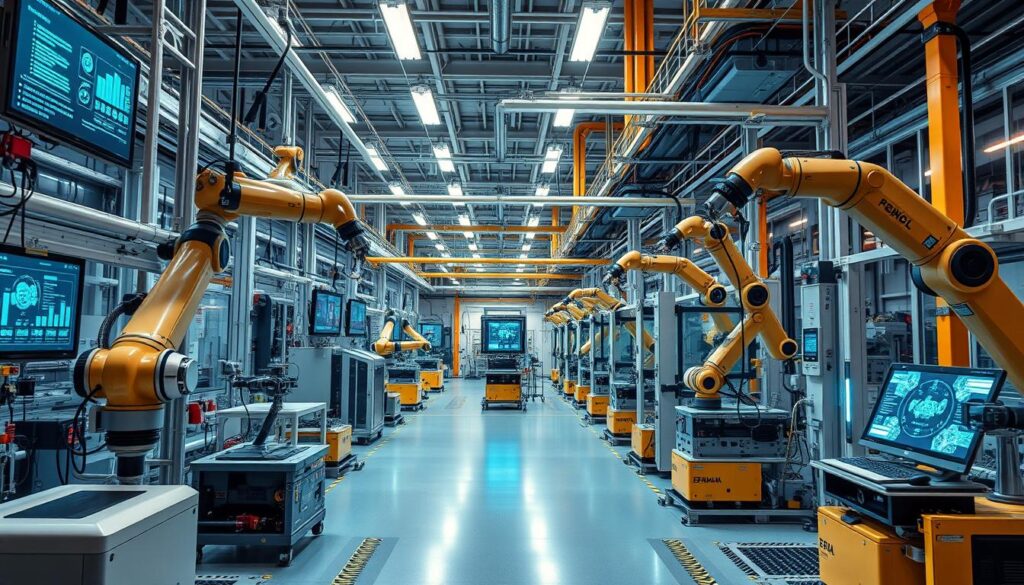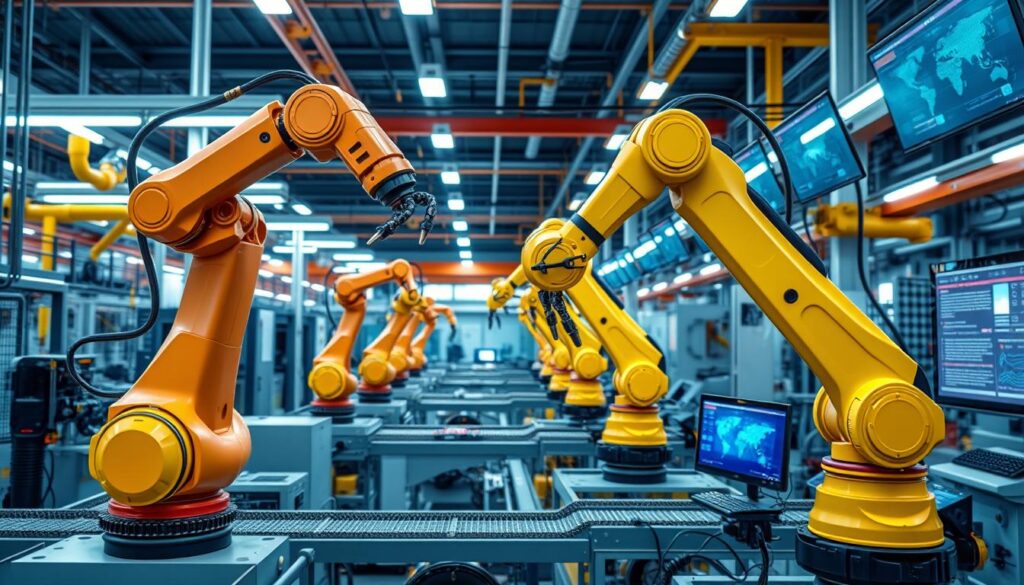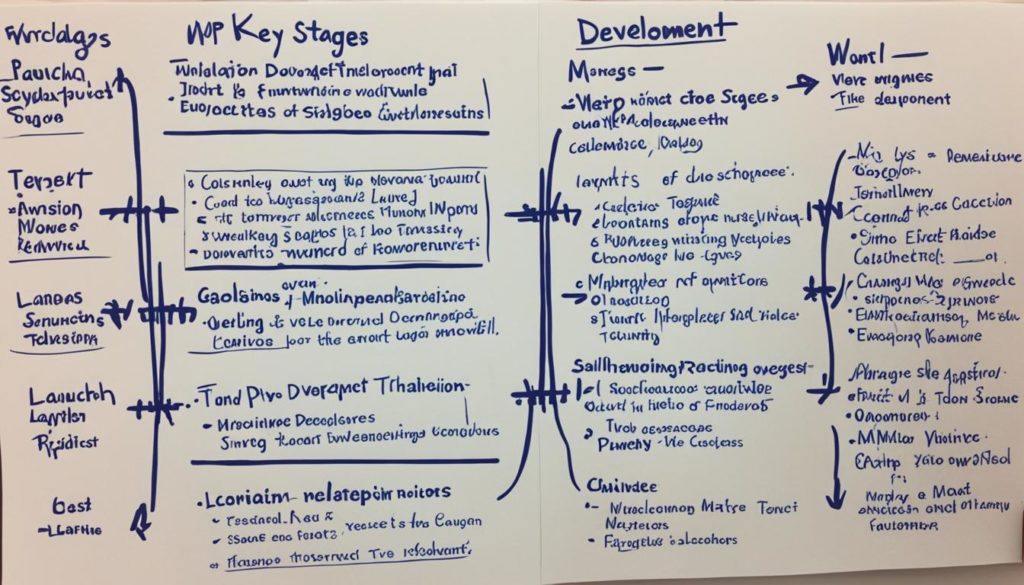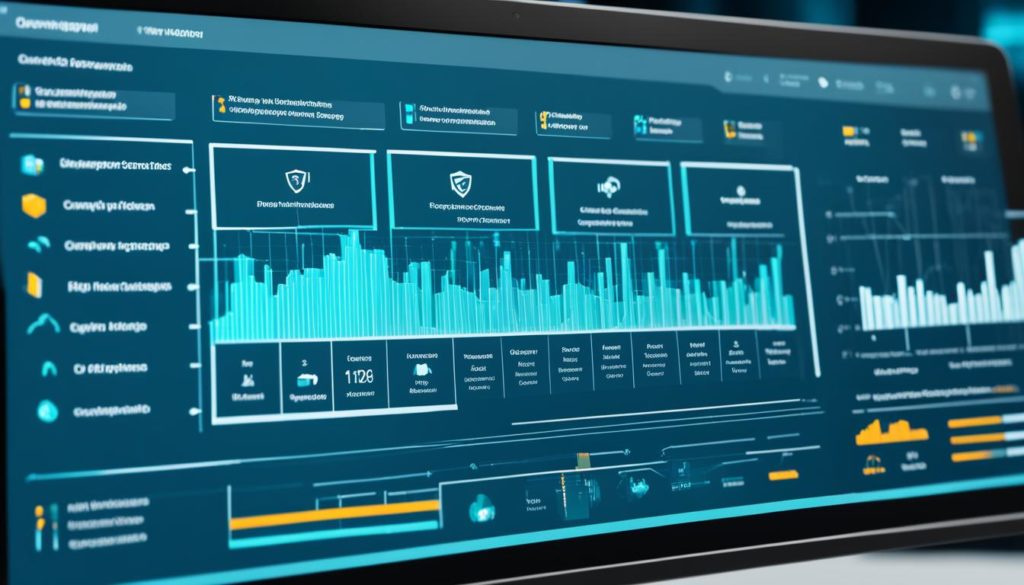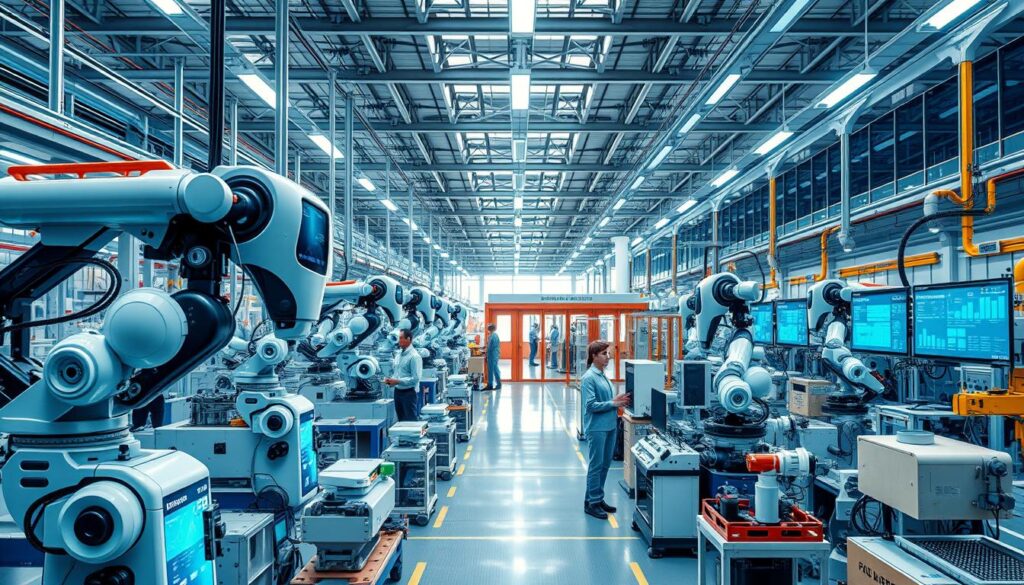
Did you know Industry 4.0 is changing the manufacturing world? It’s all about data, connectivity, and new tech like robotics. McKinsey says this digital shift could make businesses more efficient and productive.
Companies like ET2C are leading the way. They’ve been around for over twenty years and use smart tech to stay ahead. This helps them compete in the market.
ET2C is a big player in Industry 4.0. They have a team of 250 people in seven offices in Asia. They use drones to make deliveries better and check warehouses. AI and data analytics help them understand what customers want.
By using new tech, ET2C makes things more efficient. They also offer services that fit what clients need. This leads to better productivity, competition, and safety at work.
Key Takeaways
- Industry 4.0 transformation reshapes the manufacturing sector driven by disruptive trends.
- ET2C’s dedication spans over twenty years and includes a team spread across seven offices in Asia.
- Smart technology integration such as drones and AI optimizes logistics, inventories, and warehouse inspections.
- Data analytics provide valuable real-time insights into customer needs, enabling tailored services.
- Advanced technologies promise increased efficiency, productivity, and competitiveness in traditional industries.
Understanding Industry 4.0 and Its Core Components
Industry 4.0 is a big step forward in managing industrial processes. It uses digital technologies to connect the physical and digital worlds. Key parts include AI, IoT, big data, robotics, and cloud computing. These work together to make operations more efficient and help make decisions based on data.
Before 2014, “Industry 4.0” was barely known. But by 2019, 68% of companies saw it as a top priority. Also, 70% were starting to use these new technologies, showing how fast smart manufacturing is growing.
Switching to Industry 4.0 means using technologies like IoT connectivity, AI, and big data. This makes production more tailored, cuts down on waste, and improves product quality. Around the world, 103 factories are already using these technologies well.
Teaching workers new skills is key to Industry 4.0. In Europe, 94% of leaders think workers should be reskilled as much as hired. In the U.S., it’s 62%. This shows the need for workers who can handle new tech.
Knowing the technologies involved is crucial for businesses wanting to use Industry 4.0. The main parts are:
- Cyber-physical systems
- IoT connectivity
- AI integration
- Big data analytics
- Cloud computing
- Robotics
Together, these parts make manufacturing more efficient, flexible, and quick to respond.
Using these technologies means giving cyber-physical systems more control. They use real-time data to predict when things might break, cutting downtime and costs. This leads to a world where factories can monitor assets in real-time, make products just for customers, and try out new business ideas.
Industry 4.0 is more than just new tech; it’s a big change that needs careful planning, training workers, and strong security. By using these technologies, companies can make more, waste less, and work better. As we keep moving forward, we’ll see more smart manufacturing in different areas.
How Smart Manufacturing Drives Efficiency and Productivity
Smart manufacturing is changing the game with new tech. It uses cyber-physical systems, data analytics, and automation to boost productivity. This shift is key to Industry 4.0, a concept from Germany in 2011. It includes automation, robotics, and the Internet of Things (IoT).
The Role of Automation and Robotics
Automation and robotics are changing manufacturing. They’ve moved us from manual to automated processes. This has cut down on human mistakes and improved quality and scale.
In Japan, the car industry uses a lot of robots, with 323 per 10,000 people. In contrast, the U.S. car industry lost market share from 1960 to 1997. This shows how important it is to keep up with new tech.
Implementing Internet of Things (IoT) in Manufacturing
The IoT has brought new levels of connection and data sharing to factories. It uses smart devices for real-time info and tracking. This is key for keeping things running smoothly and managing inventory.
Companies like ET2C use drones for checking inventory and quality. This shows how IoT can make operations more efficient. It helps create a data-rich environment for better decision-making.
Leveraging Big Data Analytics for Informed Decision Making
Big data analytics is a core part of Industry 4.0. It turns data into useful insights. This helps businesses make smart choices and strategies.
For example, predictive analytics helps predict market needs. This means better resource use and custom customer experiences. It’s all about staying ahead in a fast-changing world.
| Element | Description |
|---|---|
| Automation and Robotics | Minimizes human intervention, increases precision, and enhances scalability. |
| Internet of Things (IoT) | Enables real-time communication, predictive maintenance, and precise tracking. |
| Big Data Analytics | Transforms data into actionable insights, optimizing production and strategy. |
The future of manufacturing is all about these technologies. By embracing smart manufacturing, businesses can become more efficient and adaptable. For more on this, check out this comprehensive overview.
Digital Transformation: The Heart of Industry 4.0
In the age of Industry 4.0, digital transformation is key to modern manufacturing. AI helps businesses improve efficiency and automate operations. This leads to better problem-solving and operational excellence.
Enhancing Operational Efficiency with AI
AI boosts operational efficiency and optimizes logistics. Companies like ET2C use AI for smarter logistics. This speeds up decision-making and problem-solving.
AI offers scalable solutions for various sectors. It drives efficiency improvements across industries.
Data-Driven Decision Making and Predictive Maintenance
Data-driven decisions in AI manufacturing are game-changing. They give businesses deep insights into operations and trends. Predictive maintenance uses AI to foresee issues before they happen.
Companies like Festo, Kao, and AkzoNobel use IoT, machine learning, and AI for predictive maintenance. They show how AI leads to operational excellence.
Businesses should take a full digital transformation approach. This avoids common mistakes like siloed implementations. Instead, focus on connected systems and AI for better efficiency.
This approach boosts productivity and reduces costs. It also makes businesses more sustainable, improving overall performance.
Revolutionizing Supply Chain with Industry 4.0
Industry 4.0 is changing how businesses manage their supply chains. It brings new technologies to make things more efficient and clear. By using real-time data, companies can make their logistics better and manage their supply networks better. This section explores how these changes are making a big difference.
Optimizing Supply Chain with Real-Time Data
Real-time data is key for many reasons. It helps businesses get insights quickly, making their operations more agile. The IoT market for supply chains is expected to hit $34.91 billion by 2027. This shows how important it is for modern logistics.
This growth highlights the benefits of Industry 4.0. It makes it easier for suppliers, partners, and customers to work together smoothly.
Improving Inventory Management through Advanced Technologies
New tech like drones and IoT sensors is changing inventory management. Companies using smart stock control solutions see big improvements. The global cloud-based supply chain market was $21.26 billion in 2022 and is expected to grow a lot more.
This shows we need better inventory solutions to manage today’s supply chains.
The Impact of Global Connectivity on Supply Chain Efficiency
Global connectivity is key for efficient supply chains. It helps teams work better together and solve international sourcing problems. ET2C’s global strategies show how connected supply models and digital ecosystems can help businesses grow.
By 2024, 50% of supply chain organizations might use AI, Gartner says. This shows how fast technology is changing supply chains. It’s all about using digital tools to improve operations and work better with people and robots.
Looking ahead, using real-time data and managing supply networks well will be crucial. It will help businesses stay competitive in a fast-changing world.
Conclusion
We’ve looked at how Industry 4.0 changes businesses, making them leaders in the digital world. New tech like AI, 3D printing, and self-driving systems are changing fast. This is making today’s industries strong and new.
More than 20 billion devices will be connected by 2020. This shows how important the Internet of Things (IoT) is. It helps create networks that are very connected.
Having the right data skills is key for companies going digital. Knowing how to use data helps make better decisions. It also helps plan for the future and keep things running smoothly.
Working together is important in this digital world. It helps bring new tech together smoothly. We’ve seen how important it is to trust in digital tech and data.
Keeping data safe is a big deal. We need strong systems to protect our digital stuff from cyber threats.
Industry 4.0 uses new tech like Cyber-Physical Systems, IoT, Robotics, and Big Data. It’s making manufacturing smarter and more efficient. This leads to better productivity and success.
FAQ
What is Industry 4.0 and why is it important?
Industry 4.0 is the next step in making manufacturing smarter. It uses advanced technology, IoT, and better human-machine interaction. It makes businesses more efficient and productive, keeping them up-to-date with the latest tech.
How does smart manufacturing differ from traditional manufacturing?
Smart manufacturing uses AI, big data, and IoT to make processes more efficient. It’s different from traditional manufacturing, which relies on manual work. Smart manufacturing cuts down on human mistakes and improves workflow.
What role do automation and robotics play in Industry 4.0?
Automation and robotics are key in Industry 4.0. They make production lines more precise and efficient. This helps businesses stay competitive in a tech-driven world.
How is IoT implemented in manufacturing settings?
IoT in manufacturing connects smart devices and sensors in real-time. It helps manage and monitor production. This leads to better maintenance, tracking, and inventory management, making processes smoother.
Can you explain the impact of big data analytics on manufacturing?
Big data analytics helps manufacturers understand market trends and optimize resources. It predicts demand and offers personalized customer experiences. This data-driven approach is vital for Industry 4.0.
How does AI enhance operational efficiency in manufacturing?
AI improves logistics and operational efficiency by adding advanced cognition to manufacturing. It speeds up decision-making and problem-solving, making manufacturing smarter and more responsive.
What is predictive maintenance and how does it benefit manufacturing?
Predictive maintenance uses AI to forecast issues before they happen. This approach reduces downtime and maintenance costs, ensuring a reliable manufacturing process.
How does real-time data optimize supply chains?
Real-time data improves connectivity and collaboration in supply chains. It ensures smooth integration between suppliers, partners, and customers. This leads to better logistics, inventory management, and customer interaction.
What advanced technologies are used in inventory management?
Technologies like drones and IoT devices improve inventory management. They enable precise tracking, reduce stockouts, and enhance warehouse operations. This leads to greater efficiency.
How does global connectivity impact supply chain efficiency?
Global connectivity improves collaboration and unity in supply chains. It allows businesses to expand globally and share resources more efficiently. Digital platforms make international sourcing and procurement smoother, boosting supply chain performance.
Future App Studios is an award-winning software development & outsourcing company. Our team of experts is ready to craft the solution your company needs.


